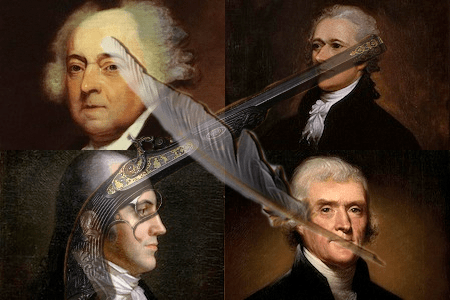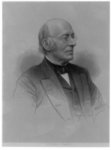After watching the current events of this 2016 election, the American people can agree as a whole that this Presidential race has been significantly different than ones we have seen before. The two candidates take and give personal blows to each other, and the electorate watches as what seems as the most personal election in recent history. With careful consideration of previous American Presidential Elections, one might be reminded of another election just as personal, maybe even more so, than our current one. The Election of 1800, or as Thomas Jefferson put it: the “Revolution of 1800.”1
This gruesome election was between Federalist and incumbent John Adams with his running mate Charles C. Pinckney and Democratic-Republican and principal author of the Declaration of Independence Thomas Jefferson with his running mate Aaron Burr. In this story we have an interesting cast of characters, all of which are very prominent figures in the history of the early Republic. The men involved had intricate personal relationships that acted as a catalyst in the crucible that would become the Election of 1800.
All men involved came from some form of political or military merit. John Adams was a prominent voice in declaring America’s Independence. Thomas Jefferson had been the United States Minister to France (he had spent a majority of the war and its aftermath in France). Aaron Burr had been a colonel in the Continental Army. Most of the men were quite fond of each other due to the fact that they had worked with each other before, although all had one thing in common: their distaste for Alexander Hamilton, Chief de Aide for General George Washington during the Revolutionary War and Senior Officer in the Continental Army. Hamilton was a stubborn man. Years before the election Hamilton had attempted to destroy Adams in his Adams’ Pamphlet, 2. He continuously bashed heads with Jefferson, while both he and Jefferson served in George Washington’s Presidential Cabinet in the early 1790s; and Hamilton was very vocal in his distaste of Aaron Burr.

At the beginning of the race, much of the American population was not too fond of President Adams’s Administration. With the implementation of the highly unpopular Alien and Sedition Acts, which was an act of law signed by Adams himself in 1798 that allowed the deportation of foreigners, the Federalist party itself seemed to fall apart. Only some truly supported Adams. With the relative unity of the Democratic-Republican Party and the particular favoritism of Jefferson in the South and Aaron Burr in New York, the Federalists feared that their opponents would win the presidency. In November of 1800 the election began, and as the ballots came in, the results only surprised a few. Adams received sixty-five votes while Jefferson received seventy-three. The election seemed to have been won, but something went wrong. The members of the electoral college failed to hold back one of their votes for Burr, which caused a vote count tie of seventy-three votes for each Jefferson and Burr, and thus propelled the two into a one on one race for presidency. 3
Alexander Hamilton, seeing both of his enemies with the potential to become president, felt himself in a sticky situation. Adams seeing this, laughed at Hamilton, saying,“The very man—the very two men—of all the world that he was most jealous of are now placed above him.”4 Hamilton had to put his pride aside and place his support behind one of these men for the betterment of the country.
Aaron Burr, being Jefferson’s running mate, was also put in an uncomfortable situation. He came into the race as just a Vice Presidential candidate; now he had to go against Jefferson for the presidential seat. Most people believed that Burr should just give Jefferson the position, even if Burr might have won by a landslide in the coming vote in the House, where the tie would be decided. This was not Burr’s intention. After being Jefferson’s running mate in the previous election, the Election of 1796, Burr had been left with a bitter taste in his mouth after Jefferson himself won the Vice Presidency and left him with nothing in fourth place. Burr even went so far as to say “As to my Jeff, what happened at the last election (Et tu Brute!).” 5 Burr was in it to win it.

Now that Adams, the Federalist Presidential Nominee, was out of the picture, the Federalists were in a scattered frenzy over whom they should pick: Jefferson or Burr. Most contemplated giving their votes to Burr due to the fact that most Federalists saw Jefferson as unfit to run for such an office, or as Robert G. Harper, a Federalist, put it: Jefferson was possibly able to be “a professor in a college or a president of a philosophy society,” but definitely not the head of our nation. 6 Others that were in favor of Jefferson were known to be quite violent in their advocacy, some even stating that if Burr were elected in place of Jefferson “we will march and dethrone him as an usurper.” 7
Finally, in February of 1801, the voting went to the House of Representatives. All sixteen states were allowed a single vote, and the winner only needed a majority of nine votes. The voting went on for five days. Tensions rose, state militas threatened to rise if a president was not elected. The House went through thirty-five votes, and each time they reached the same result: a tie. Then men grew restless and began to seek out an easy way out, and this is when Hamilton seized any opportunity he could to write to each of his Federalists colleagues in the electoral college to either withdraw their vote or place it for Jefferson.
James A. Bayard, a Federalist from Delaware, began to listen to Hamilton’s plea. For all thirty-five previous votes, Bayard had voted for Burr, but after reading Hamilton’s letters, Bayard began to weaken his support for Burr. Finally on the thirty-sixth vote, Bayard inserted a blank vote and abstained Delaware’s vote. At the same time two other representatives gave in as well and also withdrew their votes, allowing Jefferson to win ten votes, and thus win the presidency.
The general confusion of the Election of 1800 led the next Congress to pass the Twelfth Amendment, which revised the way the electoral college elected the President and Vice President. In addition to the passing of the Twelfth Amendment, personal feuds came to fruition after Burr’s lost. Burr believed Hamilton was the greatest impediment in his path for success and challenged him to a duel. In 1804, both left to New Jersey and Burr shot down Hamilton.
- Alan Brinkley, American History: Connecting with the Past. Volume 1: to 1865 (New York: McGraw-Hill Education, 2015), 177. ↵
- Ron Chernow, Alexander Hamilton (New York : Penguin Press, 2004), 619. ↵
- Brinkley, American History: Connecting with the Past, 178. ↵
- Chernow, Alexander Hamilton, 632. ↵
- Chernow, Alexander Hamilton, 634. ↵
- Chernow, Alexander Hamilton, 634. ↵
- Chernow, Alexander Hamilton, 635. ↵



84 comments
Marlene Lozano
This is a great article, the reader is able to tell the topic was well researched. I love how you wrote the introduction to your article. I find it interesting that even in the early days of the United States both candidates took personal blows to each other. It is amazing to see that the American Democracy has not changed that much from the election of Burr and Jefferson.
Jason Garcia
Very well researched and thought out. I never knew that personal attacks were used in the days of the early U.S. I thought it very interesting to read about the politics of the old U.S government. This makes me think of this past election and how the American people were conflicted in who to vote for but now that I have read this article I know that it is nothing new in the American democracy.
Natalia Flores
This article was well researched and well grounded. The political fight between Burr and Jefferson is amazingly complex, especially the personal blows they throw at each other. The whole thing with militias rising up if the president was not elected is very frightening and makes one realize how fragile our nation was when it was just beginning to form. Is it wrong of me to hear Hamilton the musical playing the my head while reading this article?
Mario Sosa
It never occurred to me just how reminiscent the 2016 election was to the 1800 election. Given the fact that Hamilton was responsible for Burr losing the election to Jefferson, I can see why Burr had a great hatred for Hamilton. While I felt that the article got cut off abruptly at the end, I can see that this was a very well researched and informative article. Good job!
Alyssa Vela
This was a great article! I loved your introduction, you did great on capturing my attention and keeping it throughout the whole article! You did great in jumping into the minds of the candidates, which really gave me insight on the actual subject at hand. Overall you can tell that you put a lot of research into this article, and did great on weaving all of your information together. Keep it up! I look forward to reading more of your work.
Teresa Valdez
I really love how the article is so well tied into recent events. I knew that Burr had been Jefferson’s running mate. However, it was a mystery to me as to how Burr and Jefferson became so competitive during the election of 1800 due to Hamilton the Musical. Now, I know. This article weaves a very insightful narrative into the minds of the candidates, especially with Hamilton as a unifying thorn in their sides. Well done!
Cameron Mays
This article was a well-timed one because of the recent election that took place. It’s always important to look back to history so that we don’t repeat ourselves. With all of the fuss about the problems of today’s elections we become blind to the fact that at least it wasn’t like this one- which would cause an egregious uproar across the country, thanks for writing it. Well done.
Oscar Portillo
Being a Alexander Hamilton fan myself I definitely see the unenviable place he was in and must say that it must have been gut wrenching to have to support one or the other. This is analogous to the 2016 election in which many Americans decided not to vote because of the fact that they, like Hamilton, were convinced that either candidate was bad with one being slightly better than the other. I was captivated by this article and wanted it to keep going. However, I will say Aaron Burr was a character himself and we were better off without him since he tried to achieve unpatriotic goals though underhanded means such as killing Hamilton. In conclusion, Hamilton’s vision of the U.S. is now more prevalent than Jefferson’s since we did transition into a stronger more centralized government.
Aaron Mcglown
Wow! I was hooked immediately. You have a strong introductory paragraph and that help made the rest of your article great. Looking back at this election I remember telling myself this is a hostile election. Well, I guess history does repeat itself. The Election of 1800 came with changes. How similar these elections are maybe this election will come with changes.
Aaron Jaramillo
After reading your introduction I was hooked on the rest of the article! I liked how you related how personal the Election of 1800 and the recent election were. I heard very little of the Election of 1800 and you did a great job of explain the election. Changes were made after the Election of 1800, lets see if the recent election comes with modifications as well.